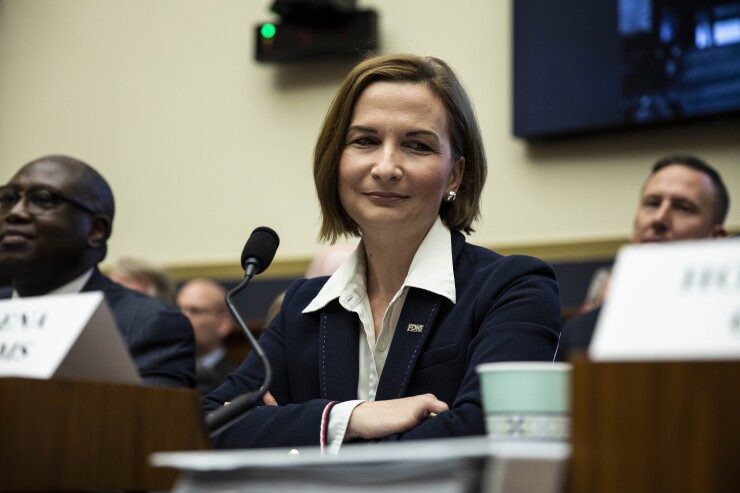WASHINGTON — Federal Deposit Insurance Corp. Chairman Jelena McWilliams said if regulators fail to agree on joint guidance regarding banks' use of artificial intelligence, her agency is prepared to go it alone.
“It’s something we're working through and frankly, I’m hoping we can do it on an interagency basis,” McWilliams said during a fintech event on Friday. “And if we can’t, I’m willing to take the risk of the FDIC being the outlier in this space.”
McWilliams said it’s critical that regulators offer guidance on how banks can use machine learning and AI technology, particularly for the thousands of community banks that the FDIC oversees.
“There’s an opportunity as a regulator of primarily small banks in the United States to allow those banks to compete more effectively by using technology and innovation,” said McWilliams, speaking at the Washington site of a trans-Atlantic event hosted by the U.K.'s Financial Conduct Authority. “We need to make that happen and we need to provide for them the regulatory certainty within which they can function.”

Banks and regulators have been weighing how AI can be used to better detect money-laundering threats, for example. McWilliams said all the federal banking agencies and the National Credit Union Administration have been meeting with the Office of Foreign Assets Control and Financial Crimes Enforcement Network every month to weigh how fintech can safely play into banking and regulatory activities, such as developing anti-money-laundering controls.
“You will see a little bit more coming out as we unroll and we have a better understanding of what exactly can be done in this space,” she said.
McWilliams has been working to revamp the FDIC to be more forward-looking on technology since she took office. Like other banking agencies, the FDIC is currently building an office of innovation for banks and fintechs to discuss ideas, pilots and how to test products without being blocked by regulations.
“Whether banks choose to develop technology on their own or partner with a fintech, the FDIC will work with them to identify and remove unnecessary regulatory impediments,” she said. “Through engagement and technical assistance, we can help eliminate the regulatory uncertainty that prevents some banks from adopting new technologies.”
McWilliams said part of the agency's efforts to encourage innovation is by allowing banks to do pilots with some greenlighting from the FDIC. The agency is also considering how it can “seed some of the projects” with initial funding “through the procurement process,” she said.
“We’re going to be open-minded, forward-looking and encouraging innovation,” McWilliams added. “And looking for ways for regulatory assistance ... to nurture it,” she said.
The FDIC is also looking at how it can implement regulatory technology internally, often called regtech, as a replacement for costly outsourced government contracting.
“We are considering acquisition strategies for new regtech and sup-tech solutions that will encourage innovation and problem-solving more quickly and at less cost than traditional government contracting,” she said. “These approaches will encourage nontraditional partners to engage in the development of cutting-edge technology, and will help avoid the limitations of monolithic, government-imposed technological mandates that are too expensive and out-of-date by the time they are developed.”





